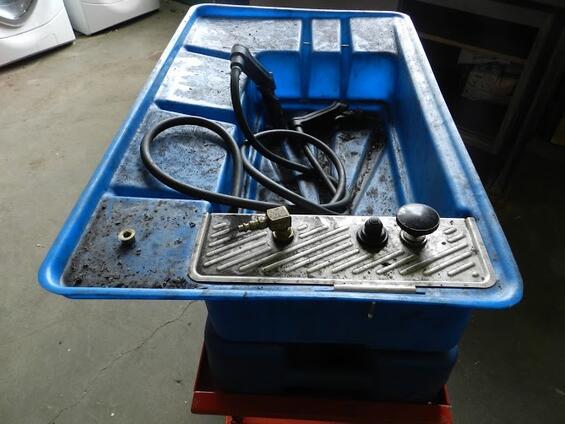Download this Fact Sheet as a PDF
Download the MassCAR Water-Based Brake Cleaning Fact Sheet.
What is Water-Based Brake Cleaning?
Implementing water-based brake cleaning involves wetting the brake/clutch with a hose or spray bottle to prevent dust from getting in the air and then wiping the wet area with a damp cloth to collect all dust. You can also rent equipment that can collect all of the dust in a basin to be disposed of as hazardous waste.
Both OSHA and the US EPA identify wet cleaning process as a preferred method for doing brake work. Switching to a water-based brake cleaning system will not only eliminate the use of toxic chemicals, but will reduce workers exposure to asbestos and other harmful dusts that become airborne during the brake cleaning process.
If you do not choose to move to a water-based brake cleaning system, be sure to avoid aerosol cleaners that contain chlorinated solvents and/or list any of the following ingredients: perchloroethylene, PCE or ‘perc’, tetrachloroethylene, methylene chloride.
Benefits of water-based cleaning methods:
- Your water-based brake cleaning sink may be able to double as a water-based parts washing sink, further reducing the use of toxic aerosols in your shop. Purchasing one-time use aerosol cans are typically much more expensive than using an aqueous brake cleaning system.
- Water-based cleaning systems are nonflammable.
- When you reduce the use of aerosol cans, you reduce the amount of solid waste you produce as well as your solid waste disposal costs.
Using an aqueous brake cleaning system reduces worker exposure to harmful chemicals and reduces the amount of harmful VOCs that are released into the environment.
Many people believe that asbestos has been banned, but unfortunately it is still used in brakes and clutches. This means that it is very important that you protect your lungs during any brake job.
Sometimes you can buy new brakes or clutches that are specifically labeled as ‘asbestos-free’. However, you should assume that all clutches and brakes on the cars coming into your shop, or any replacement that is not labeled as ‘asbestos-free’, contain asbestos.
Since asbestos exposure can cause lung damage or cancer, it is important to take these measures to protect yourself:
- Try to purchase ‘asbestos-free’ brakes and clutches.
- Use a ‘wet cleaning’ method during brake and clutch jobs. This involves wetting the brake / clutch with a hose or spray bottle to prevent dust from getting in the air and then wiping the wet area with a damp cloth to collect all dust. You can also rent equipment that can collect all of the dust in a basin to be disposed of as hazardous waste.
- Protect your lungs by wearing an N-95 dust mask during all brake/clutch jobs.
It is also important that you protect yourself by NOT doing the following
- NEVER use compressed air for cleaning yourself or the work area. Compressed air blows dust and asbestos into the air.
- NEVER clean brakes or clutches with a dry rag, brush (wet or dry), or garden hose.
- NEVER use an ordinary wet/dry vac without a high-efficiency particulate air (HEPA) filter to vacuum dust. Invisible particles of brake or clutch dust can stay in the air and on your clothes long after a job is complete.
- NEVER take work clothing inside the home or track dust through the house after performing brake and clutch work to prevent exposing your family to dust particles that may contain asbestos.

An aqueous brake cleaning sink.
Take the Next Step
Contact the Office of Technical Assistance (OTA):
OTA’s Tiffany Skogstrom (617-626-1086) and Marina Gayl (617-626-1077) have expertise in auto shop environmental safety. They can offer free and confidential assistance and advice.
Talk to Your Supplier
Find out if your supplier can offer or recommend a water-based brake cleaning system. Safety-Kleen, Fountain Industries, and Ammcoats are a few know vendors of portable water-based brake cleaning sinks.
Find Additional Information
- Follow the recommendations in US EPA’s Preventing Asbestos Exposure Among Brake and Clutch Repair Workers and OSHA’s bulletin on Asbestos-Automotive Brake and Clutch Repair Work
- View California’s Department of Health Services on the health effects associated with aerosol cleaners: Aerosol Cleaner Use in Auto Repair
- View the California Department of Toxics Substances Control’s aqueous brake cleaning fact sheet:
Aqueous Brake Cleaning
Contact
Phone
You will be connected to the person who can best answer your questions.